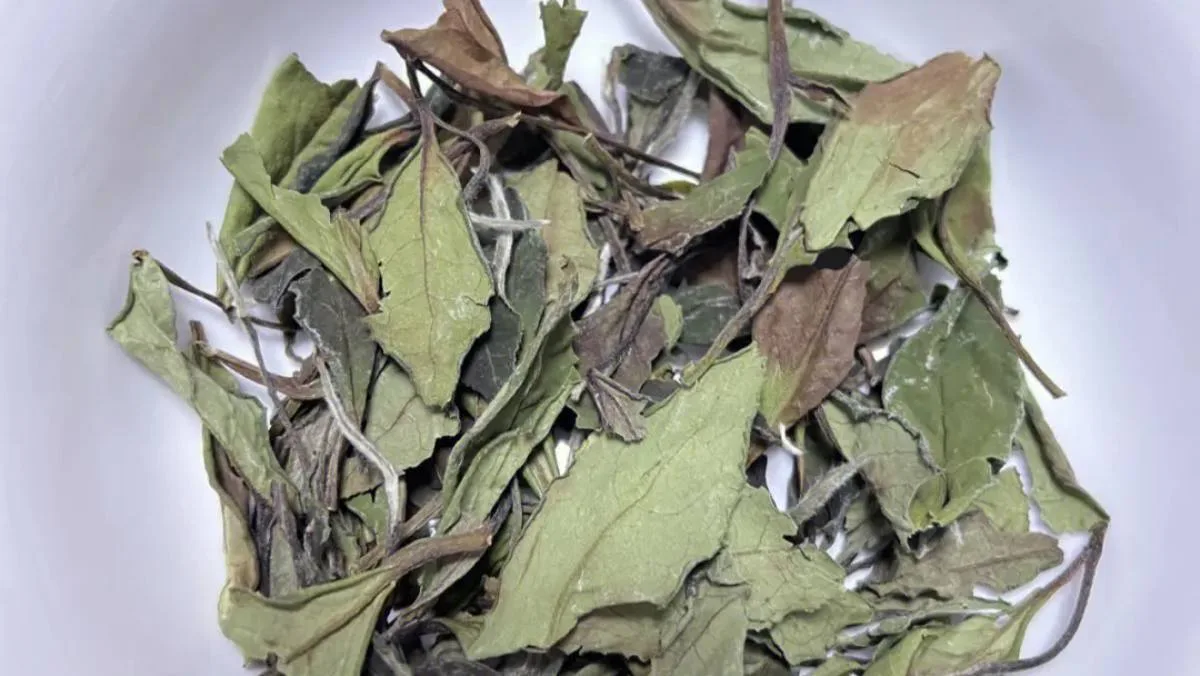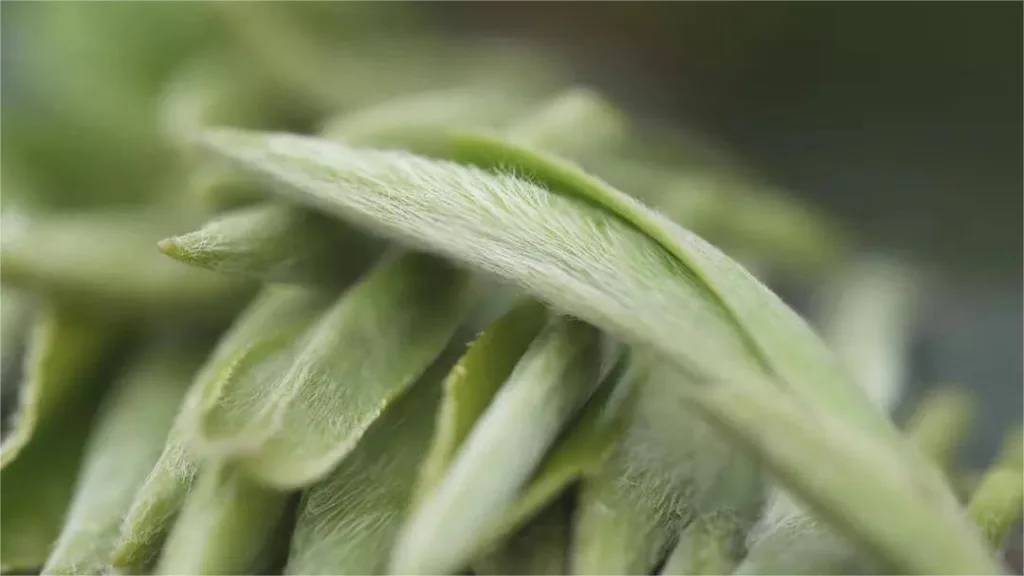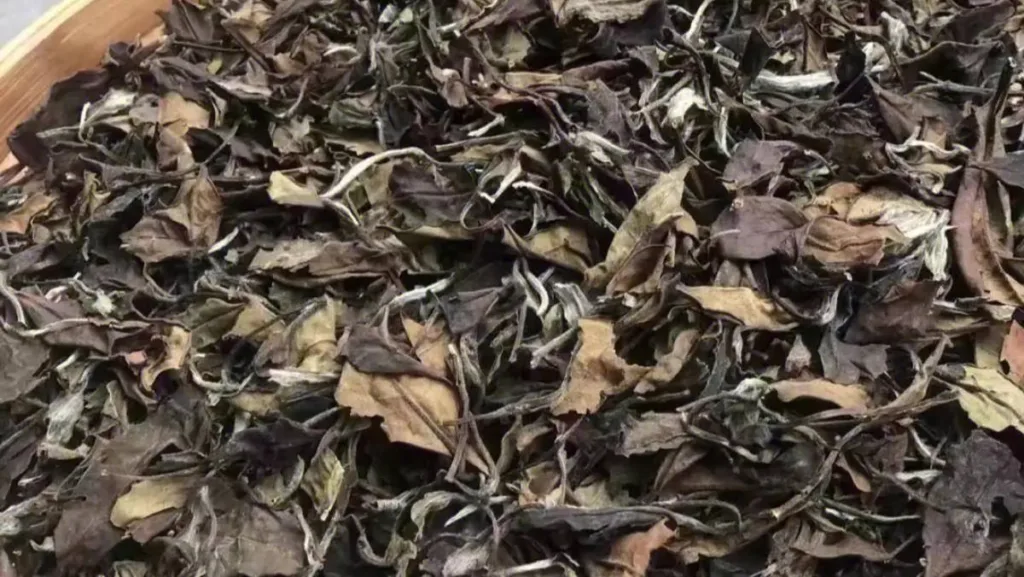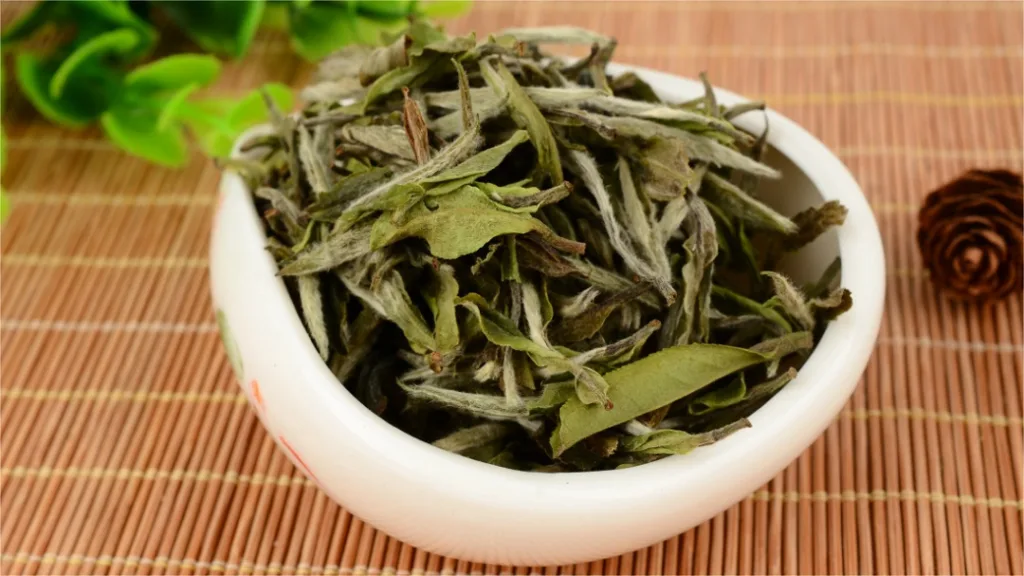Shoumei tea, also known as “寿眉” in Chinese, is a variety of white tea made from the leaves of the Fuding Large White and Fuding White tea trees in Fujian, China. Shoumei leaves are slightly plump and tender, and the buds and leaves are connected without old stems. The leaves are rolled into a shape resembling eyebrows and emit a pure fragrance. The tea made from tea buds is called “Xiaobai” to distinguish it from “Dabai” tea made from the buds and leaves of Fuding Large White tea and Zhenghe Large White tea trees.
Cai Cha’s tea buds were once used to make Baihao Yinzhen (Silver Needle) tea. Later, Dabai was used to produce Baihao Yinzhen and Baimudan, while Xiaobai was used to create Gongmei tea.
Shoumei tea is primarily produced in Zherong County in the city of Ningde, Fujian, and in Guanyang Town, Banxi Town, and Diantou Town in Fuding City, as well as in Zhenghe County, Jianyang City, Songxi County in Nanping City, and other regions. Shoumei accounts for more than half of the total white tea production. The plucking standard for making Gongmei is typically one bud with two leaves or one bud with two or three leaves, and it should contain tender and robust buds. The initial refining process is similar to that of Baimudan.
High-quality Shoumei tea is characterized by abundant downy buds, a lustrous green color, orange-yellow or deep yellow liquor, even, soft, and bright tea leaves at the bottom of the cup. The main veins of the leaves appear red when held up to the light. The taste is mellow, refreshing, and the aroma is pure. The plucking standard is typically one bud with two leaves or one bud with two or three leaves, and it should contain white downy hairs. High-quality Shoumei has a lustrous green color, and the liquor is typically orange-yellow.
History
In the “Jianou County Chronicles,” it is recorded: “White tea is produced in the West District and Zixi in the towns of Jianyang (including 16 villages in Zhangdun Town, 3 villages in Xiaohu Town, and 2 villages in Shuiji Town), and the procurement is very refined. Although the production volume is not high, the value is high, and it is purchased by wide-ranging merchants. It is also exported to Annan, Jinshan, and other ports.” At that time, the “white tea” mentioned was later referred to as “Shoumei” in the 1940s. In the twenty-ninth year of the Republic of China (1940), the Fujian Provincial Tea Bureau issued documents listing the number of boxes of high-quality Shoumei tea leaves for various counties and tea factories, as well as the number of boxes exported abroad. Among the two categories and five colors of tea in Shuiji County, “Shoumei” had the largest share.
Shoumei tea has been known by this name for at least several hundred years in Guangdong, Hong Kong, and Macau. It has become synonymous with white tea in these regions.
Brewing Method
Understanding the size of the gaiwan (lidded bowl) is important when brewing Shoumei tea. Small gaiwans, around 120ml in size, are commonly used for this purpose. It’s crucial not to choose a gaiwan with too large a capacity, as handling it might become tricky. You’ll be using boiling water to brew, and the tea can get heavy.
Getting the tea quantity right is also key. A 120ml gaiwan with about 5g of Shoumei tea is just right. However, if you’re unsure about your brewing technique and the pour speed, using slightly less tea can prevent the tea from becoming too bitter if the steeping time is extended.
Controlling the steeping time can be a challenging task. The first infusion is crucial because if it’s too long, it might ruin the subsequent infusions. Shoumei tea is particularly susceptible to bitterness from extended brewing times. The tea contains abundant compounds, especially in the spring-harvested Shoumei, so it’s best to keep the first few infusions short, ideally around 5 seconds. A timer can be useful to practice and perfect your timing.
Health Benefits
Shoumei tea offers several health benefits, making it a refreshing and healthful beverage:
- Cooling and Detoxifying: Shoumei tea has a remarkable cooling effect and is known for its detoxification properties. It can relieve symptoms of excessive internal heat, making it a traditional remedy for heat-related illnesses.
- Balanced Nature: Shoumei tea has a moderate nature, neither too cold nor too hot. It possesses antioxidant properties, helps eliminate toxins, and promotes metabolism. This makes it a great choice for overall well-being.
- Heat Relief: Shoumei tea is known for its heat-relieving properties, making it a perfect summer beverage. It can boost your spirits, making you feel refreshed and relaxed.
Shoumei tea is rich in amino acids, tea polyphenols, minerals, various vitamins, zinc, selenium, and other essential trace elements. It is a recognized safe and nutritious green beverage that can quench your thirst, clear your mind, and provide numerous health benefits.
Whether you enjoy the refreshing and gentle flavors of Shoumei tea as a daily beverage or use it for its therapeutic qualities, this white tea from Fujian has a lot to offer. Its history, unique characteristics, and health benefits make it a cherished part of China’s tea tradition and a delightful tea to savor.



